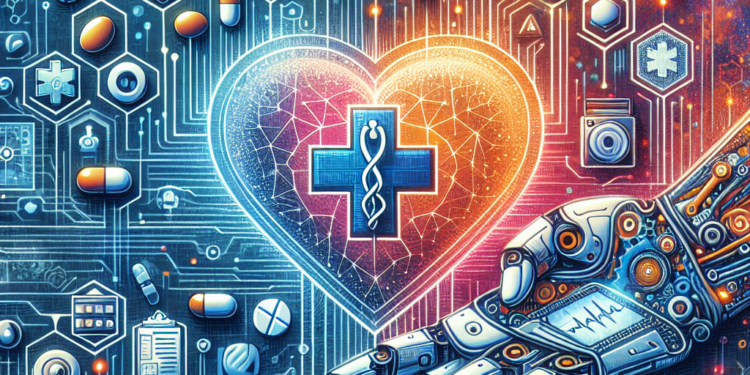Artificial Intelligence (AI) has made significant advancements in healthcare in recent years, revolutionizing how medical professionals diagnose, treat, and manage patient care. From early detection of diseases to personalized treatment plans, AI tools have the potential to streamline healthcare processes, improve patient outcomes, and reduce costs. In this article, we will explore some of the top AI tools that are transforming healthcare applications.
1. IBM Watson Health
IBM Watson Health is a powerful AI tool that uses cognitive computing to analyze and interpret large amounts of complex healthcare data. With Watson Health, healthcare professionals can access personalized treatment options based on a patient’s unique healthcare data, medical history, and genetic information. Watson Health also provides insights that can help improve patient outcomes, optimize clinical workflows, and enhance decision-making processes.
2. Google DeepMind
Google DeepMind is an AI tool that has been developed by Google’s parent company, Alphabet, to help healthcare professionals analyze and interpret medical images, such as X-rays and MRIs. DeepMind uses deep learning algorithms to detect patterns and anomalies in medical images, helping radiologists and other healthcare professionals make more accurate diagnoses. DeepMind is also being used to automate administrative tasks, such as scheduling appointments and managing medical records, to improve efficiency in healthcare settings.
3. Enlitic
Enlitic is a healthcare AI tool that uses deep learning algorithms to analyze medical images, such as CT scans and ultrasounds, to assist radiologists in making faster and more accurate diagnoses. Enlitic can detect subtle differences in medical images that may not be visible to the naked eye, helping healthcare professionals identify diseases at earlier stages and develop more targeted treatment plans. Enlitic is also being used to predict patient outcomes and recommend personalized treatment options based on a patient’s healthcare data.
4. Zebra Medical Vision
Zebra Medical Vision is an AI tool that uses deep learning algorithms to analyze medical images and detect potential health risks in patients. Zebra Medical Vision can identify patterns and anomalies in medical images, such as signs of cancer, heart disease, and other health conditions, to help healthcare professionals make more accurate diagnoses and develop personalized treatment plans. Zebra Medical Vision is also being used to automate the analysis of medical images, reducing the time and cost associated with manual interpretation.
5. Microsoft Healthcare NExT
Microsoft Healthcare NExT is a collaborative initiative that combines AI, cloud computing, and healthcare expertise to develop innovative solutions for healthcare applications. Microsoft Healthcare NExT is working on projects such as developing AI-powered chatbots to provide patients with personalized health information, using AI to improve clinical workflows and decision-making processes, and leveraging cloud-based technologies to securely store and analyze healthcare data. Microsoft Healthcare NExT aims to empower healthcare professionals with tools that can improve patient outcomes, reduce costs, and enhance the overall quality of care.
6. Ada Health
Ada Health is an AI-powered healthcare platform that uses machine learning algorithms to provide personalized health assessments and recommendations to patients. Ada Health uses a chatbot interface to collect information about a patient’s symptoms, medical history, and lifestyle factors, and then generates a personalized health report with potential diagnoses, treatment options, and preventive measures. Ada Health aims to empower patients to take control of their health and make informed decisions about their healthcare, while also helping healthcare professionals to provide more targeted and effective care.
7. Infermedica
Infermedica is an AI-driven healthcare platform that uses natural language processing and machine learning algorithms to provide personalized health assessments and triage services to patients. Infermedica collects information about a patient’s symptoms, medical history, and risk factors, and then generates a diagnostic report with potential conditions, treatments, and recommendations. Infermedica is also being used to automate medical history-taking processes, improve patient engagement, and optimize clinical workflows in healthcare settings.
8. NVIDIA Clara
NVIDIA Clara is an AI platform developed by NVIDIA that uses deep learning algorithms to analyze medical images and data, such as CT scans, MRIs, and genomic information, to assist healthcare professionals in making more accurate diagnoses and treatment decisions. NVIDIA Clara provides advanced imaging and AI capabilities that can help healthcare professionals detect rare diseases, predict patient outcomes, and develop personalized treatment plans. NVIDIA Clara is also being used to accelerate research and development in healthcare, enabling new discoveries and innovations in medical science.
9. Cyrcadia Health
Cyrcadia Health is a healthcare AI tool that uses predictive analytics and machine learning algorithms to analyze data from wearable devices, such as smart bras, to monitor a woman’s breast health and detect early signs of breast cancer. Cyrcadia Health can detect changes in breast tissue temperature over time, which may indicate the presence of abnormal cells or tumors. By analyzing this data, Cyrcadia Health can provide early warnings and alerts to patients and healthcare professionals, enabling early detection and intervention for breast cancer.
10. Qualcomm Life
Qualcomm Life is a healthcare AI platform developed by Qualcomm that uses machine learning and predictive analytics to analyze healthcare data from various sources, such as wearable devices, electronic health records, and medical imaging systems, to provide personalized health insights and recommendations. Qualcomm Life aims to improve patient outcomes, reduce healthcare costs, and enhance the overall quality of care by leveraging AI technologies to generate real-time patient monitoring and diagnostic services. Qualcomm Life is also being used to develop new healthcare applications and services that can empower patients and healthcare professionals with tools to better manage their health.
In conclusion, AI tools are revolutionizing healthcare applications by providing healthcare professionals with powerful tools that can analyze and interpret complex healthcare data, detect patterns and anomalies in medical images, and provide personalized health assessments and recommendations to patients. These AI tools have the potential to transform healthcare processes, improve patient outcomes, and reduce costs, making healthcare more efficient, effective, and accessible for patients and healthcare professionals alike. As AI technologies continue to evolve and advance, we can expect to see even more innovative solutions that can revolutionize the way healthcare is delivered and experienced.













